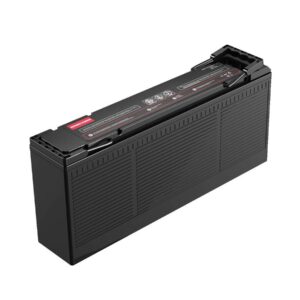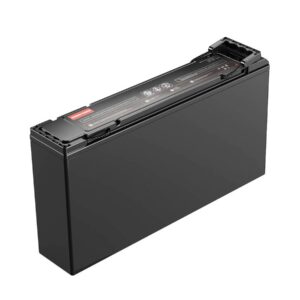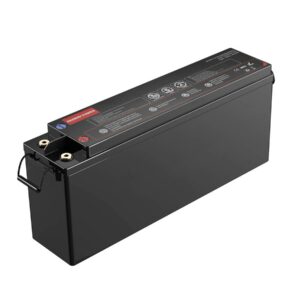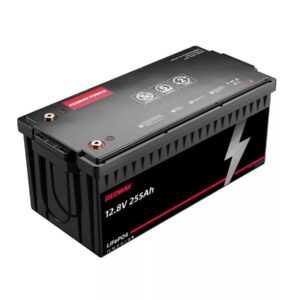12V 100Ah Lithium Battery
Our 12V 100Ah LiFePO4 Battery is a cutting-edge energy solution engineered for demanding applications like RVs, marine systems, and solar setups. As a trusted lithium battery manufacturer, we specialize in OEM/ODM partnerships, delivering high-performance, durable batteries with smart technology integration …
12V 100Ah Lithium Battery (Cylindrical Cell)
This LiFePO4 (LFP) cylindrical cell battery has a nominal voltage of 12.8V and a nominal capacity of 100Ah, providing 1280Wh of energy. It supports a maximum continuous charge and discharge current of 100A, with a max charge voltage …
12V 100Ah Lithium Car Starting Battery CCA 1000A
Our 12V 100Ah LiFePO4 Car Starting Battery redefines automotive power with lithium iron phosphate technology. As a leading lithium battery manufacturer, we specialize in OEM solutions that combine lightweight design, high cranking power, and exceptional durability for modern vehicle demands.…
12V 120Ah Lithium Battery
Our 12V 120Ah LiFePO4 Battery (Group 31) is a premium lithium power solution engineered for demanding applications. As an innovative lithium battery manufacturer, we deliver OEM-ready energy storage systems that combine high capacity, extended lifespan, and robust safety features for …
12V 120Ah Lithium Battery (Cylindrical Cell)
Our advanced lithium battery solutions integrate proprietary self-balancing technology and rugged IP65-rated construction, engineered for commercial and off-grid applications. As a leading lithium battery manufacturer, we empower OEM partners and wholesale buyers with scalable, durable energy storage systems that deliver …
12V 150Ah Lithium Battery
Our 12V 150Ah Lithium Iron Phosphate Battery is a premium energy storage solution engineered for OEM partnerships and high-demand commercial applications. As a leading lithium battery manufacturer, we deliver cutting-edge technology that combines durability, efficiency, and versatility to meet the …
12V 150Ah Lithium Battery
Our Smart Safety Architecture Lithium Battery Series delivers unmatched reliability for industrial and commercial applications. As a premier lithium battery manufacturer, we specialize in OEM solutions that combine advanced safety protocols with high energy density, ensuring optimal performance and compliance …
12V 150Ah Lithium Battery (Cylindrical Cell)
This 12.8V 150Ah LiFePO4 battery offers a high-performance energy storage solution with a nominal energy of 1920Wh. It features a nominal voltage of 12.8V and a nominal capacity of 150Ah, making it suitable for applications like solar power …
12V 180Ah Lithium Battery
Our 12V 200Ah Lithium Iron Phosphate Battery sets a new standard for industrial energy storage, combining high-power performance with space-saving design. As a trusted lithium battery manufacturer, we deliver OEM-optimized solutions that enhance operational efficiency and reduce long-term costs for …
12V 180Ah Lithium Battery (Cylindrical Cell)
Our 12V 180Ah LiFePO4 Battery (Cylindrical Cell) is a cutting-edge energy storage solution designed for high-demand applications. As a lithium battery manufacturer specializing in OEM partnerships, we deliver customizable, durable, and efficient power systems for RVs, marine setups, solar installations, …
12V 18Ah Lithium Battery
Our 12V 18Ah Lithium Iron Phosphate Battery is a high-efficiency power solution engineered for OEM partnerships and wholesale distribution. Combining LiFePO4 technology with a lightweight design, this lithium battery delivers reliable performance across electric mobility, solar energy storage, and industrial …
12V 200Ah Lithium Battery
The 12.8V 200Ah LiFePO4 battery offers robust performance with a nominal energy capacity of 2560Wh, making it ideal for high-demand applications. It supports a maximum continuous charge and discharge current of 100A, ensuring efficient power flow. The battery …
12V 20Ah Lithium Battery
Our 12V 20Ah Lithium Iron Phosphate (LiFePO4) Battery is a high-performance energy solution engineered for OEM and wholesale buyers. As a trusted lithium battery manufacturer, we deliver compact, durable, and customizable power systems ideal for emergency lighting, marine equipment, and …
12V 24Ah Lithium Battery
Our 12V 24Ah Lithium Battery from Redway Power is a cutting-edge energy solution engineered for versatility and reliability. As a trusted lithium battery manufacturer, we specialize in delivering OEM-focused designs that combine advanced LiFePO4 technology with customizable features to meet …
12V 250Ah Lithium Battery
The 12.8V 250Ah LiFePO4 battery offers a powerful energy solution with a nominal energy capacity of 3200Wh, making it ideal for high-demand applications. It supports a maximum continuous charge and discharge current of 200A, ensuring efficient and reliable …
12V 300Ah Lithium Battery
This LiFePO4 12.8V 300Ah battery delivers a high nominal energy of 3840Wh, supporting a maximum continuous charge and discharge current of 200A. It operates with a max charge voltage of 14.6V and a discharge cut-off voltage of 10V…
12V 30Ah Lithium Battery
Our 12V 30Ah LiFePO4 Battery is a cutting-edge lithium iron phosphate power solution engineered for versatility across solar energy systems, RVs, and electric vehicles. As a trusted lithium battery manufacturer, we specialize in delivering OEM/ODM-ready designs that combine reliability, efficiency, …
12V 400Ah Lithium Battery
The Redway Power 12V 400Ah Lithium Battery is a high-capacity energy solution engineered for demanding off-grid, RV, and marine applications. As a leading lithium battery manufacturer, we specialize in OEM/ODM partnerships, delivering durable LiFePO4 technology with unmatched reliability and customization …
12V 40Ah 36Ah Lithium Car Starting Battery CCA 400A
Our 12V 40Ah/36Ah Lithium Iron Phosphate (LiFePO4) Car Starting Battery delivers exceptional power and reliability for automotive applications. As a leading lithium battery manufacturer, we specialize in OEM/ODM solutions, offering customizable, high-performance energy systems that meet rigorous industry standards.
Key
…12V 500Ah Lithium Battery
Our 12V 500Ah Lithium Iron Phosphate Battery is a premium energy storage solution engineered for high-capacity applications. As a trusted lithium battery manufacturer, we specialize in delivering OEM-ready LiFePO4 systems that combine durability, safety, and scalability for RVs, marine equipment, …
12V 50Ah Lithium Battery
Our 12V 50Ah LiFePO4 Battery is a cutting-edge energy solution engineered for versatility and reliability. As a trusted lithium battery manufacturer, we specialize in delivering OEM-ready power systems for RVs, marine equipment, solar installations, and industrial applications, combining advanced technology …
12V 50Ah Lithium Car Starting Battery CCA 500A
Our 12V 50Ah LiFePO4 Car Starting Battery is a cutting-edge lithium battery solution engineered for automotive excellence. As a trusted lithium battery manufacturer, we deliver OEM and ODM clients a lightweight, high-performance power source with exceptional durability, advanced safety features, …
12V 60Ah Lithium Car Starting Battery CCA 1000A
Our 12V 60Ah LiFePO4 Car Starting Battery delivers exceptional power and reliability for automotive applications. As a trusted lithium battery manufacturer, we specialize in OEM/ODM solutions, providing high-performance energy systems that meet the rigorous demands of modern vehicles and industrial …
12V 60Ah Lithium Car Starting Battery CCA 600A
Our 12V 60Ah Lithium Starter Battery redefines automotive power solutions with advanced LiFePO4 technology. As a trusted lithium battery manufacturer, we deliver OEM-ready systems offering unmatched reliability, extended lifespan, and cold-weather performance for global automotive applications.
Key Features
High-Cranking Power…
12V 6Ah Lithium Battery
Our 12V 6Ah Lithium Battery (LiFePO4) delivers reliable power for alarm systems, marine electronics, and portable devices. As a professional lithium battery manufacturer, we specialize in OEM/ODM solutions with advanced LiFePO4 technology, combining compact design and long – term durability …
12V 75Ah Lithium Battery
Our 12V 75Ah Lithium Battery (Group 24) is a cutting-edge energy storage solution engineered for RVs, marine systems, solar setups, and industrial applications. As a trusted lithium battery manufacturer, we specialize in delivering OEM/ODM-ready products that combine advanced LiFePO4 technology …
12V 80Ah Lithium Car Starting Battery CCA 1200A
Our 12V 80Ah LiFePO4 Car Starting Battery is a premium lithium battery solution engineered for automotive reliability and accessory power support. As a leading lithium battery manufacturer, we specialize in OEM and ODM partnerships, delivering cutting-edge energy storage systems that …
12V 80Ah Lithium Car Starting Battery CCA 1200A
Our 12V 80Ah LiFePO4 Car Starting Battery is a cutting – edge automotive power solution designed for reliability and performance. As a leading lithium battery manufacturer, we specialize in OEM – ready designs that deliver exceptional safety, longevity, and adaptability …



























